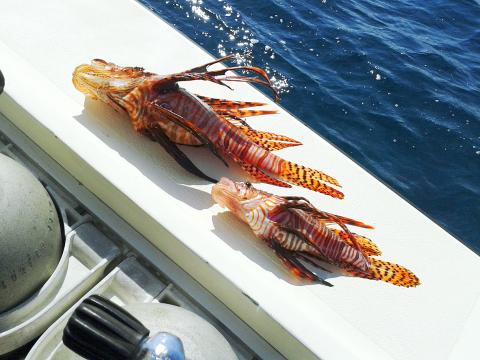In a reef just off the popular USS Kittiwake dive site in Grand Cayman, hunters armed with spears seek out lionfish — an invasive species so destructive that authorities want them caught and served up as a tasty dish.
With their striking pectoral fins and venomous dorsal spikes that fan out like a lion’s mane, the lionfish have few natural predators and eat up smaller fish, shrimp and crab that protect the reef.
The Cayman Islands are fighting back with a campaign that encourages local divers to hunt lionfish — which number in the tens of thousands — so that restaurants can serve them up to tourists.

Photo: Reuters
Call it the “if you can’t beat ‘em, eat ‘em” approach.
Lionfish has begun to match grouper, snapper and mahi-mahi as a delicacy in Cayman, where more than a dozen restaurants now have them on the menu.
“Boy, are they good to eat,” said celebrity Spanish chef Jose Andres, who went hunting during a Cayman Cookout event. “Their sweet, white meat is unbelievable as a ceviche or sauteed with fresh herbs,” he said.
After a diver speared one on a recent trip, a teenage girl on vacation from Texas inspected the foot-long (30.48cm) catch approvingly.
“I had lionfish tacos at Tukka,” she said of a restaurant on the island.
Thomas Tennant, a chef for the upscale Michael’s Genuine Food & Drink, now buys 120 pounds (54.4kg) of lionfish a week from local divers at US$5.50 a pound, serving diners a variety of dishes from raw, to a sandwich and a main course.
Native to the Indo-Pacific, lionfish are believed to have spread after some escaped from a private aquarium in south Florida during Hurricane Andrew in 1992.
They have since migrated throughout the warm waters of the Gulf of Mexico, the Caribbean and even the eastern US seaboard as far as Rhode Island, where they die in winter.
The fish are small and only 40 percent of the body is edible meat after removing the head, spines and bones, meaning time-consuming work for chefs.
The concept of eating them has caught on elsewhere too. A Lionfish Festival, dubbed “Feast on the Beast” was held last month in southwest Florida with local chefs in Fort Myers cooking up 90kg of lionfish fillets to benefit a local charity.
There is no way to calculate the size of the invasion.
“The number would be astounding,” said Lad Akins, director of special projects at REEF, an ocean conservation nonprofit based in the Florida Keys.
Site densities of 3,000 lionfish in an area roughly the size of a US football field have been found in the Caribbean and the Gulf of Mexico, he said.
A commercial lionfish export company, Spinion Ltd, created in the Cayman Islands in 2012, sells an average of 90kg to 115kg a week to five local restaurants.
With rising demand, some restaurants, including Guy Harvey’s, are now importing lionfish from Honduras.
“We didn’t have enough lionfish here to satisfy the customer,” manager Bruno Deluche said.

Taiwan’s technology protection rules prohibits Taiwan Semiconductor Manufacturing Co (TSMC, 台積電) from producing 2-nanometer chips abroad, so the company must keep its most cutting-edge technology at home, Minister of Economic Affairs J.W. Kuo (郭智輝) said yesterday. Kuo made the remarks in response to concerns that TSMC might be forced to produce advanced 2-nanometer chips at its fabs in Arizona ahead of schedule after former US president Donald Trump was re-elected as the next US president on Tuesday. “Since Taiwan has related regulations to protect its own technologies, TSMC cannot produce 2-nanometer chips overseas currently,” Kuo said at a meeting of the legislature’s

TECH WAR CONTINUES: The suspension of TSMC AI chips and GPUs would be a heavy blow to China’s chip designers and would affect its competitive edge Taiwan Semiconductor Manufacturing Co (TSMC, 台積電), the world’s biggest contract chipmaker, is reportedly to halt supply of artificial intelligence (AI) chips and graphics processing units (GPUs) made on 7-nanometer or more advanced process technologies from next week in order to comply with US Department of Commerce rules. TSMC has sent e-mails to its Chinese AI customers, informing them about the suspension starting on Monday, Chinese online news outlet Ijiwei.com (愛集微) reported yesterday. The US Department of Commerce has not formally unveiled further semiconductor measures against China yet. “TSMC does not comment on market rumors. TSMC is a law-abiding company and we are

FLEXIBLE: Taiwan can develop its own ground station equipment, and has highly competitive manufacturers and suppliers with diversified production, the MOEA said The Ministry of Economic Affairs (MOEA) yesterday disputed reports that suppliers to US-based Space Exploration Technologies Corp (SpaceX) had been asked to move production out of Taiwan. Reuters had reported on Tuesday last week that Elon Musk-owned SpaceX had asked their manufacturers to produce outside of Taiwan given geopolitical risks and that at least one Taiwanese supplier had been pushed to relocate production to Vietnam. SpaceX’s requests place a renewed focus on the contentious relationship Musk has had with Taiwan, especially after he said last year that Taiwan is an “integral part” of China, sparking sharp criticism from Taiwanese authorities. The ministry said

Semiconductor shares in China surged yesterday after Reuters reported the US had ordered chipmaking giant Taiwan Semiconductor Manufacturing Co (TSMC, 台積電) to halt shipments of advanced chips to Chinese customers, which investors believe could accelerate Beijing’s self-reliance efforts. TSMC yesterday started to suspend shipments of certain sophisticated chips to some Chinese clients after receiving a letter from the US Department of Commerce imposing export restrictions on those products, Reuters reported on Sunday, citing an unnamed source. The US imposed export restrictions on TSMC’s 7-nanometer or more advanced designs, Reuters reported. Investors figured that would encourage authorities to support China’s industry and bought shares